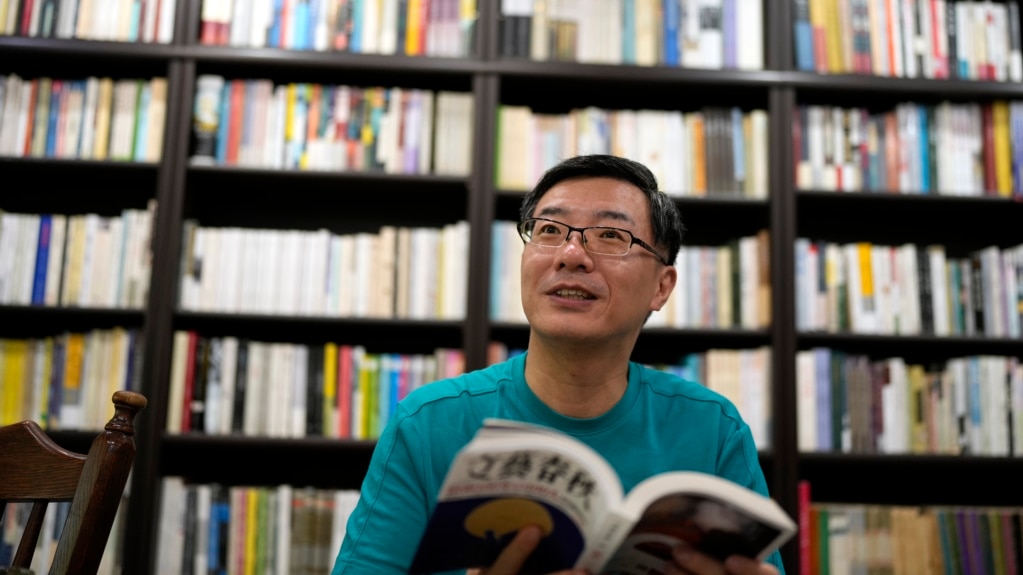Chinese migrants are going all over the world, from Mexico to Thailand and beyond.
But one country has become increasingly popular among Chinese migrants: Japan.
Many Chinese who choose to move to Japan are wealthy or highly educated. They like the country’s ease of living, rich culture and immigration policies that favor highly skilled professionals.
Intellectuals
Jia Jia is a writer and speaker at the University of Tokyo. Eight years ago, he was briefly detained in China on suspicion of writing a call for China’s top leader to resign.
Jia planned to move to the United States. But after experiencing the coronavirus outbreak in China, he was in a hurry to leave, and his American visa application was delayed. So, he chose to go to Japan instead.
“In the United States, illegal immigration is particularly controversial. When I went to Japan, I was a little surprised. I found that their immigration policy is actually more relaxed than I thought,” Jia told The Associated Press.
Li Jinxing is a Christian human rights lawyer who moved to Japan in 2022. Li sees similarities to a time over one hundred years ago. Back then, Chinese intellectuals such as Sun Yat-sen, the founding father of modern China, went to Japan to study how the country modernized.
“On one hand, we hope to find inspiration and direction in history,” Li said of himself and like-minded Chinese in Japan. “On the other hand, we also want to observe what a democratic country with rule of law is like. We’re studying Japan. How does its economy work, its government work?”
Changing immigration policy
Over the past 10 years, Tokyo has softened its position on immigration. The policy change was a result of the country’s low birthrates and ageing population.
Foreigners now make up about two percent of its population of 125 million. But the Tokyo-based National Institute of Population and Social Security Research says that percentage is expected to reach 12 percent by 2070.
Chinese are the most numerous newcomers to Japan. Of the 3 million foreigners living in Japan last year, Chinese represented about 822,000, government data shows. That number is up from 762,000 a year ago.
In 2022, China’s “zero COVID” public health policies led many of the country’s young or wealthy citizens to leave. There is even a term for it: “runxue,” using the English word “run” to suggest “running away” to places considered safer and wealthier.
For intellectuals like Li and Jia, Japan offers greater freedom than China. But for others, such as wealthy investors and businesspeople, Japan offers property protections.
Property protections
A report by investment migration company Henley & Partners says nearly 14,000 millionaires left China last year. That is the most of any country in the world. Japan was a popular destination for Chinese millionaires.
Q. Edward Wang teaches history at Rowan University in Glassboro, New Jersey. Wang said a major reason is concern about the security of wealth in China.
“Protection of private property, which is the cornerstone of a capitalist society, that piece is missing in China,” Wang said.
In addition, the weakening Japanese yen makes buying property and other local assets a good deal.
And while the Japanese economy has not had major growth recently, China’s economy is facing problems. The property market is in crisis and stock prices have stayed at the level they were at in the late 2000s.
“If you are just going to Japan to preserve your money,” Wang said, “then definitely you will enjoy your time in Japan.”
Internet-based business leaders are among those leaving China after Communist Party crackdowns on the technology industry. For example, billionaire Jack Ma, a founder of e-commerce company Alibaba, took a position at Tokyo College, part of the highly respected University of Tokyo.
So many wealthy Chinese have bought apartments in Tokyo’s costly buildings that some areas have been called “Chinatowns,” or “Digital Chinatowns.” The term describes how many of the homeowners in those places work in high-tech industries.
“Life in Japan is good,” said Guo Yu, an engineer who retired early after working at ByteDance, the parent company of TikTok.
Guo does not concern himself with politics. He loves Japan’s snow in the winter and is a “superfan” of its hot springs. He owns homes in Tokyo and in other places.
Like Guo, many Chinese moving to Japan are wealthy and educated. The Japanese government has been careful about who it lets stay, placing importance on people to fill labor shortages for factories, construction and health care for the aged.
“It is crucial that Japan becomes an attractive country for foreign talent so they will choose to work here,” Japanese Prime Minister Fumio Kishida said earlier this year.
False warnings
Chinese ballet dancer Du Hai said he has found a chance to use his talent in Japan. Leading a class one recent weekend, Du showed dance positions to a class of Japanese students.
Du liked Japan’s large ballet community, filled with professional groups and talented dancers. But he was also worried about warnings that Japanese people were unfriendly.
Such warnings turned out to be false, he said with a laugh. Now, Du is considering getting Japanese citizenship.
“Of course, I enjoy living in Japan very much now,” he said.
I’m John Russell.
And I’m Ashley Thompson.

